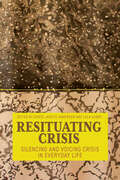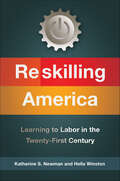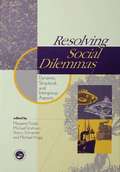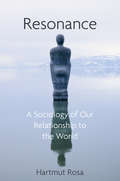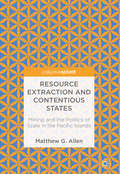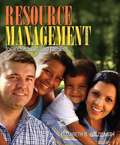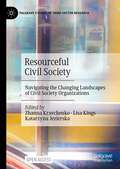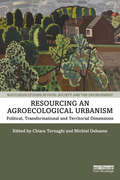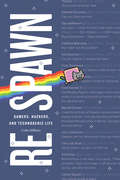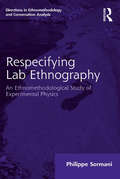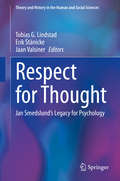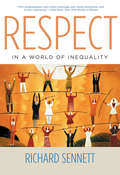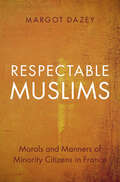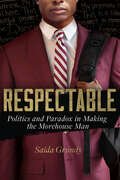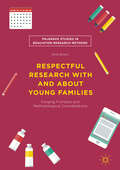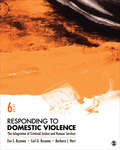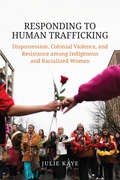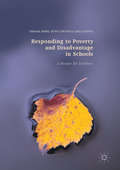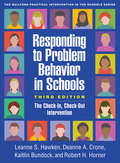- Table View
- List View
Resituating Crisis: Silencing and Voicing Crisis in Everyday Life
by Dorte Jagetic Andersen Lola AubryThe world is increasingly influenced by ongoing crisis, or at least this is what mainstream media and politics wants us to believe. When portrayed here, crisis most often comes in the form of situations challenging a sense of normality, such as with violent conflicts, pandemics, or forced migration. However, crisis is not just a situation twisting normality but can become constitutive of normality itself. In exploring transformative and constructive elements to being in crisis, this volume resituates the view on crisis in everyday life to foster critical and nuanced examination of discourses on and experiences of it.
Reskilling America: Learning to Labor in the Twenty-First Century
by Katherine S. Newman Hella WinstonFrom Katherine Newman, award-winning author of No Shame in My Game, and sociologist Hella Winston, a sharp and irrefutable call to reenergize this nation's long-neglected system of vocational trainingAfter decades of off-shoring and downsizing that have left blue collar workers obsolete and stranded, the United States is now on the verge of an industrial renaissance. Companies like Apple, BMW, Bosch, and Volkswagen are all opening plants and committing millions of dollars to build products right here on American soil. The only problem: we don't have a skilled enough labor pool to fill these positions, which are in many cases technically demanding and require specialized skills. A decades-long series of idealistic educational policies with the expressed goal of getting every student to go to college has left a generation of potential workers out of the system. Touted as a progressive, egalitarian institution providing opportunity even to those with the greatest need, the American secondary school system has in fact deepened existing inequalities, leaving behind millions of youth, especially those who live in the de-industrialized Northeast and Midwest, without much of a future at all. We can do better, argue acclaimed sociologists Katherine Newman and Hella Winston. Taking a page from the successful experience of countries like Germany and Austria, where youth unemployment is a mere 7%, they call for a radical reevaluation of the idea of vocational training, long discredited as an instrument of tracking. The United States can prepare a new, high-performance labor force if we revamp our school system to value industry apprenticeship and rigorous technical education. By doing so, we will not only be able to meet the growing demand for skilled employees in dozens of sectors where employers decry the absence of well trained workers -- we will make the American Dream accessible to all.
Resocialising Europe in a Time of Crisis
by Nicola Countouris Mark FreedlandTerms such as 'Social Europe' and 'European Social Model' have long resided in the political and regulatory lexicon of European integration. But arguably, with the inclusion of a 'Solidarity' chapter in the Charter of Fundamental Rights, the EU social profile has entered a deep period of crisis. The ECJ judgments exemplify the unresolved tension between the EU's strong market imperatives and its fragile social aspirations while the ongoing economic crisis and the social conditions attached to 'bail out' packages are further indication of the continuing social retrenchment of social rights. The status quo is one in which workers appear to shoulder most of the risks attendant on making and executing arrangements for the doing of work. Chapters in this book advocate a reversal of this trend in favour of fair mutualization, so as to disperse these risks and share them more equitably between employers, the state, and society at large.
Resolving Social Dilemmas: Dynamic, Structural, and Intergroup Aspects
by Michael Hogg Michael Smithson Margaret Foddy Sherry SchneiderThe Single European Market has been completed, and many barriers to the free mvoement of goods, services, labour and capital have been removed. Lively and accessible throughout, the book will be compelling reading for introductory students of economics.
Resonance: A Sociology of Our Relationship to the World
by Hartmut RosaThe pace of modern life is undoubtedly speeding up, yet this acceleration does not seem to have made us any happier or more content. If acceleration is the problem, then the solution, argues Hartmut Rosa in this major new work, lies in “resonance.” The quality of a human life cannot be measured simply in terms of resources, options, and moments of happiness; instead, we must consider our relationship to, or resonance with, the world. Applying his theory of resonance to many domains of human activity, Rosa describes the full spectrum of ways in which we establish our relationship to the world, from the act of breathing to the adoption of culturally distinct worldviews. He then turns to the realms of concrete experience and action – family and politics, work and sports, religion and art – in which we as late modern subjects seek out resonance. This task is proving ever more difficult as modernity’s logic of escalation is both cause and consequence of a distorted relationship to the world, at individual and collective levels. As Rosa shows, all the great crises of modern society – the environmental crisis, the crisis of democracy, the psychological crisis – can also be understood and analyzed in terms of resonance and our broken relationship to the world around us. Building on his now classic work on acceleration, Rosa’s new book is a major new contribution to the theory of modernity, showing how our problematic relation to the world is at the crux of some of the most pressing issues we face today. This bold renewal of critical theory for our times will be of great interest to students and scholars across the social sciences and humanities.
Resonant Leadership
by Annie Mckee Richard BoyatzisThe blockbuster best seller Primal Leadership introduced us to "resonant" leaders--individuals who manage their own and others' emotions in ways that drive success. Leaders everywhere recognized the validity of resonant leadership, but struggled with how to achieve and sustain resonance amid the relentless demands of work and life. Now, Richard Boyatzis and Annie McKee provide an indispensable guide to overcoming the vicious cycle of stress, sacrifice, and dissonance that afflicts many leaders. Drawing from extensive multidisciplinary research and real-life stories, Resonant Leadership offers a field-tested framework for creating the resonance that fuels great leadership. Rather than constantly sacrificing themselves to workplace demands, leaders can manage the cycle using specific techniques to combat stress, avoid burnout, and renew themselves physically, mentally, and emotionally. The book reveals that the path to resonance is through mindfulness, hope, and compassion and shows how intentionally employing these qualities creates effective and enduring leadership. Great leaders are resonant leaders. Resonant Leadership offers the inspiration--and tools--to spark and sustain resonance in ourselves and in those we lead.
Resource Extraction and Contentious States: Mining And The Politics Of Scale In The Pacific Islands
by Matthew G. AllenThis Pivot offers a comprehensive cross-country study of the effects of large-scale resource extraction in Asia Pacific, considering how large-scale extractive industries engender contentious social, political and economic questions. Addressing the strong association in Melanesia between extractive resource industries and a spectrum of violence ranging from interpersonal to collective forms, it questions whether islands are particularly potent spaces for the contentious politics that attend enclave economies. The book brings island studies literature into a closer conversation with political and economic geography, demonstrating that islands provide rich spaces for the investigation of the socio-spatial relations at the heart of human geography’s theoretical cannon. The book also has a real-world policy edge, as the sustained and growing dominance of extractive industries, in concert with the highly contentious politics that they engender, places them at the centre of efforts to understand state formation, political reordering and the on-going negotiation of political settlements of various types throughout post-colonial Melanesia. It considers how extractive resource industries can shape processes of state formation, shedding new light on Melanesia’s resource curse.
Resource Management For Individuals And Families (Fifth Edition)
by Elizabeth B. GoldsmithResource Management for Individuals and Families contains 14 well-organized chapters divided into four parts to introduce students to the best of management thinking and practice. The fifth edition offers a new, interactive approach to teaching resource management through special features that are specifically designed to reflect the themes of choice and decision making, supporting students' interest and learning. To engage the reader, many chapters begin with a case or story from the news about families. This edition continues to pay close attention to meeting the standards and criteria for the Certified Family Life Educator (CFLE) designation of the National Council on Family Relations (NCFR).
Resourceful Civil Society: Navigating the Changing Landscapes of Civil Society Organizations (Palgrave Studies in Third Sector Research)
by Katarzyna Jezierska Zhanna Kravchenko Lisa KingsThis open access book examines how civil society organizations in Poland, Russia, and Sweden (re)act to transformations of opportunities and limitations in access to various forms of resources. The volume’s contributions discuss the constraints associated with different types of resources as well as organizations’ capacities to generate resources—or compensate for their lack—as they negotiate and contest barriers. The resourcefulness of civil society is revealed to be rooted in a variety of capabilities: converting resources, eliciting organizational change, and metamorphosing in response to organizational and environmental development.
Resourcing an Agroecological Urbanism: Political, Transformational and Territorial Dimensions (Routledge Studies in Food, Society and the Environment)
by Chiara Tornaghi and Michiel DehaeneForegrounding an innovative and radical perspective on food planning, this book makes the case for an agroecological urbanism in which food is a key component in the reinvention of new and just social arrangements and ecological practices. Building on state-of-the-art and participatory research on farming, urbanism, food policy and advocacy in the field of food system transformation, this book changes the way food planning has been conceptualised to date and invites the reader to fully embrace the transformative potential of an agroecological perspective. Bringing in dialogue from both the rural and urban, the producer and consumer, this book challenges conventional approaches that see them as separate spheres, whose problems can only be solved by a reconnection. Instead, it argues for moving away from a ‘food-in-the-city’ approach towards an ‘urbanism’ perspective, in which the economic and spatial processes that currently drive urbanisation will be unpacked and dissected, and new strategies for changing those processes into more equal and just ones are put forward. Drawing on the nascent field of urban political agroecology, this text brings together: i) theoretical re-conceptualisations of urbanism in relation to food planning and the emergence of new agrarian questions, ii) critical analysis of experimental methodologies and performing arts for public dialogue, reflexivity and food sovereignty research, iii) experiences of resourceful land management, including urban land use and land tenure change, and iv) theoretical and practical exploration of post-capitalist economics that bring consumers and producers together to make the case for an agroecological urbanism. Aimed at advanced students and academics in agroecology, sustainable food planning, urban geography, urban planning and critical food studies, this book will also be of interest to professionals and activists working with food systems in both the Global North and the Global South.
Respawn: Gamers, Hackers, and Technogenic Life (Experimental Futures)
by Colin MilburnIn Respawn Colin Milburn examines the connections between video games, hacking, and science fiction that galvanize technological activism and technological communities. Discussing a wide range of games, from Portal and Final Fantasy VII to Super Mario Sunshine and Shadow of the Colossus, Milburn illustrates how they impact the lives of gamers and non-gamers alike. They also serve as resources for critique, resistance, and insurgency, offering a space for players and hacktivist groups such as Anonymous to challenge obstinate systems and experiment with alternative futures. Providing an essential walkthrough guide to our digital culture and its high-tech controversies, Milburn shows how games and playable media spawn new modes of engagement in a computerized world.
Respecifying Lab Ethnography: An Ethnomethodological Study of Experimental Physics (Directions in Ethnomethodology and Conversation Analysis)
by Philippe SormaniRespecifying Lab Ethnography delivers the first ethnomethodological study of current experimental physics in action, describing the disciplinary orientation of lab work and exploring the discipline in its social order, formal stringency and skilful performance - in situ and in vivo. Drawing upon extensive participant observation, this book articulates and draws upon two major strands of ethnomethodological inquiry: reflexive ethnography and video analysis. In bringing together these two approaches, which have hitherto existed in parallel, Respecifying Lab Ethnography introduces a practice-based video analysis. In doing so, the book recasts conventional distinctions to shed fresh light on methodological issues surrounding the descriptive investigation of social practices more broadly. An engaged and innovative study of the encountered worksite, this book will appeal not only to sociologists with interests in ethnomethodology and the sociology of work, but also to scholars of science and technology studies and those working in the fields of ethnography and social science methodology.
Respect Yourself, Protect Yourself: Latina Girls and Sexual Identity (Intersections #14)
by Lorena GarciaExploring young Latina youth's sexual agency, education, and expressionWhile Latina girls have high teen birth rates and are at increasing risk for contracting sexually transmitted infections, their sexual lives are much more complex than the negative stereotypes of them as “helpless” or “risky” (or worse) suggest. In Respect Yourself, Protect Yourself, Lorena Garcia examines how Latina girls negotiate their emerging sexual identities and attempt to create positive sexual experiences for themselves. Through a focus on their sexual agency, Garcia demonstrates that Latina girls’ experiences with sexism, racism, homophobia and socioeconomic marginality inform how they engage and begin to rework their meanings and processes of gender and sexuality, emphasizing how Latina youth themselves understand their sexuality, particularly how they conceptualize and approach sexual safety and pleasure. At a time of controversy over the appropriate role of sex education in schools, Respect Yourself, Protect Yourself, provides a rare look and an important understanding of the sexual lives of a traditionally marginalized group.
Respect for Thought: Jan Smedslund’s Legacy for Psychology (Theory and History in the Human and Social Sciences)
by Jaan Valsiner Tobias G. Lindstad Erik StänickeThis book explores and provides an overview of the Norwegian psychologist Jan Smedslund's life work on Psycho-logic. His contributions to science have been radical not only in challenging the empirical foundation of psychology, but also in seeking to develop a viable alternative. This book brings together various reflections on his key contributions from the 1960s to the present day. The volume features three chapters by Jan Smedslund, offering his updated views on psychological science and psychotherapy. It also features contributions from several scholars that critically evaluates his legacy. His seminal ideas are discussed, revised and expanded upon and the questions raised are put in relevant historical and interdisciplinary context. Respect for Thought is a valuable resource for psychological researchers, historians of psychology, cultural psychologists, critical psychologists, theoretical psychologists, clinical psychologists and psychotherapists, social scientists, philosophers of psychology, and philosophers of science.
Respect in a World of Inequality
by Richard SennettThe powerful case for a society of mutual respect. As various forms of social welfare were dismantled though the last decade of the twentieth century, many thinkers argued that human well-being was best served by a focus on potential, not need. Richard Sennett thinks differently. In this dazzling blend of personal memoir and reflective scholarship, he addresses need and social responsibility across the gulf of inequality. In the uncertain world of "flexible" social relationships, all are troubled by issues of respect: whether it is an employee stuck with insensitive management, a social worker trying to aid a resentful client, or a virtuoso artist and an accompanist aiming for a perfect duet. Opening with a memoir of growing up in Chicago's infamous Cabrini Green housing project, Richard Sennett looks at three factors that undermine mutual respect: unequal ability, adult dependency, and degrading forms of compassion. In contrast to current welfare "reforms," Sennett proposes a welfare system based on respect for those in need. He explores how self-worth can be nurtured in an unequal society (for example, through dedication to craft); how self-esteem must be balanced with feeling for others; and how mutual respect can forge bonds across the divide of inequality. Where erasing inequality was once the goal of social radicals, Sennett seeks a more humane meritocracy: a society that, while accepting inequalities of talent, seeks to nurture the best in all its members and to connect them strongly to one another.
Respectability on Trial: Sex Crimes in New York City, 1900-1918
by Brian DonovanProviding a front row seat at critical courtroom battles over seduction, pimping, rape, and sodomy in early twentieth-century New York City, Brian Donovan uses verbatim trial transcripts to understand the city's history during the so-called "first sexual revolution." By tracing the revolutionary and repressive dimensions of this time period, Donovan reveals how conflicting ideas about sex and gender shaped the city's criminal justice system. He unearths stories of sexual violence and legal injustice that contradict the image of early twentieth-century America as a time of sexual revolution and progress. Police and courts often served the interests of the upper classes, men, and racial and ethnic majorities, but the trial transcripts included here reveal the considerable extent to which members of working-class and immigrant communities used the machinery of law enforcement for their own ends. Many previous books have fully documented and analyzed the sensational trials of turn-of-the-century New York City, but none have paid such close attention to the courtroom experiences of common city dwellers.
Respectable Citizens
by Lara A. CampbellHigh unemployment rates, humiliating relief policy, and the spectre of eviction characterized the experiences of many Ontario families in the Great Depression. Respectable Citizens is an examination of the material difficulties and survival strategies of families facing poverty and unemployment, and an analysis of how collective action and protest redefined the meanings of welfare and citizenship in the 1930s.Lara Campbell draws on diverse sources including newspapers, family and juvenile court records, premiers' papers, memoirs, and oral histories to uncover the ways in which the material workings of the family and the discursive category of 'respectable' citizenship were invested with gendered obligations and Anglo-British identity. Respectable Citizens demonstrates how women and men represented themselves as entitled to make specific claims on the state, shedding new light on the cooperative and conflicting relationships between men and women, parents and children, and citizen and state in 1930s Canada.
Respectable Muslims: Morals and Manners of Minority Citizens in France (Cambridge Studies in Social Theory, Religion and Politics)
by Margot DazeyHow do Muslims deal with the ever-increasing pressure to assimilate into European societies? Respectable Muslims tells the story of pious citizens who struggle for fair treatment and dignity through good manners and social upliftment. Based on an ethnographic inquiry into France's most prominent Muslim organization, the Union des organisations islamiques de France, the book shows how a non-confrontational approach underpins the fast-expanding Islamic revival movement in Europe. This method is mapped into Islamic notions of proper conduct, such as ihsān (excellence) or ṣabr (patience). These practices of exemplariness also reflect the often-overlooked class divisions separating Muslim communities, with middle-class leaders seeking to curb the so-called 'conspicuous' practices of lower-class worshippers. Chapters demonstrate that the insistence on good behavior comes with costs, both individually and collectively. Respectable Muslims expands on the concept of respectability politics to engage in a trans-Atlantic conversation on the role of class and morals in minority politics.
Respectable: Politics and Paradox in Making the Morehouse Man
by Saida GrundyThe making of a culture of Black male respectability at Morehouse that underlines conservative notions of gender and class—by a former Spelman student who was once "Miss Morehouse." How does it feel to be groomed as the "solution" to a national Black male "problem"? This is the guiding paradox of Respectable, an in-depth examination of graduates of Morehouse College, the nation's only historically Black college for men. While Black male collegians are often culturally fetishized for "beating the odds," the image of Black male success that Morehouse assiduously promotes and celebrates is belied by many of the realities that challenge the students on this campus. Saida Grundy offers a unique insider perspective: a graduate of Spelman college and a former "Miss Morehouse," Grundy crafts an incisive feminist and sociological account informed by her personal insights and scholarly expertise.Respectable gathers the experiences of former students and others connected to Morehouse to illustrate the narrow, conservative vision of masculinity molded at a competitive Black institution. The thirty-two men interviewed unveil a culture that forges confining ideas of respectable Black manhood within a context of relentless peer competition and sexual violence, measured against unattainable archetypes of idealized racial leadership. Grundy underlines the high costs of making these men—the experiences of low-income students who navigate class issues at Morehouse, the widespread homophobia laced throughout the college's notions of Black male respectability, and the crushingly conformist expectations of a college that sees itself as making "good" Black men. As Morehouse's problems continue to pour out into national newsfeeds, this book contextualizes these issues not as a defect of Black masculinity, but as a critique of what happens when an institution services an imagination of what Black men should be, at the expense of more fully understanding the many ways these young people see themselves.
Respectful Research With and About Young Families: Forging Frontiers and Methodological Considerations (Palgrave Studies in Education Research Methods)
by Alice BrownThis book explores the distinctive theoretical and methodological features associated with conducting ethical and respectful research with young families, along with its unique considerations and challenges. With parents and young children understood to be both major players and ‘first educators’ in supporting childhood health, development and learning, this book examines how opportunities for research can be conceptualised within this privileged space. This volume embraces an interdisciplinary approach to this research, examining topics such as researcher identity and positioning, issues of consent, notions of power and relationships with families, methods for collecting data and frameworks for making sense of that data. Rather than providing concrete methods of practices and tools, this book will help raise the consciousness of researchers who are engaged in research with these young families. It is sure to appeal to students and scholars of education and early childhood development, as well as those concerned with conducting research ethically and respectfully.
Responding to Domestic Violence: The Integration of Criminal Justice and Human Services
by Eve S. Buzawa Carl G. Buzawa Barbara J. HartA fresh look at the response to domestic violence in the United States today by experts in their field. Responding to Domestic Violence explores the response to domestic and intimate partner violence by the criminal justice system as well as public and non-profit social service and health care agencies. After providing a brief theoretical overview of the causes of domestic violence and its prevalence in society, the expert author team covers such key topics as barriers to intervention, variations in arrest practices, the role of state and federal legislation, and case prosecution. Focusing on both survivors and offenders, the book provides a thorough exploration of modern strategies to address the realities and needs of all survivors. The new edition offers new chapters on Special Populations at Risk, Victim Services, Coercive Control, Intimate Partner Stalking, and Civil and Criminal Protection Orders. All remaining chapters have been substantially or completely rewritten to reflect the growing body of research in the field.
Responding to Domestic Violence: The Integration of Criminal Justice and Human Services
by Eve S. Buzawa Carl G. Buzawa Barbara J. HartA fresh look at the response to domestic violence in the United States today by experts in their field. Responding to Domestic Violence explores the response to domestic and intimate partner violence by the criminal justice system as well as public and non-profit social service and health care agencies. After providing a brief theoretical overview of the causes of domestic violence and its prevalence in society, the expert author team covers such key topics as barriers to intervention, variations in arrest practices, the role of state and federal legislation, and case prosecution. Focusing on both survivors and offenders, the book provides a thorough exploration of modern strategies to address the realities and needs of all survivors. The new edition offers new chapters on Special Populations at Risk, Victim Services, Coercive Control, Intimate Partner Stalking, and Civil and Criminal Protection Orders. All remaining chapters have been substantially or completely rewritten to reflect the growing body of research in the field.
Responding to Human Trafficking: Dispossession, Colonial Violence, and Resistance among Indigenous and Racialized Women
by Julie KayeResponding to Human Trafficking is the first book to critically examine responses to the growing issue of human trafficking in Canada. Julie Kaye challenges the separation of trafficking debates into international versus domestic emphases and explores the tangled ways in which anti-trafficking policies reflect and reinforce the settler-colonial nation-building project of Canada. In doing so, Kaye reveals how some anti-trafficking measures create additional harms for the individuals they are trying to protect, particularly migrant and Indigenous women. The author’s critical examination draws upon theories of post- and settler-colonialism, Indigenous feminist thought, and fifty-six interviews with people in counter-trafficking employment across Western Canada. Responding to Human Trafficking provides a new framework for critical analyses of anti-trafficking and other rights-based and anti-violence interventions. Kaye disrupts measures that contribute to the insecurity experienced by trafficked women and individuals affected by anti-trafficking responses by pointing to anti-colonial organizing and the possibilities of reciprocity in relationships of care.
Responding to Poverty and Disadvantage in Schools
by Carlo Raffo Tamara Bibby Ruth LuptonThis book explores a range of challenges teachers face in dealing with situations of disadvantage, and explores different ways of thinking about these situations. Starting with a variety of incidents written by teachers in schools in disadvantaged settings, the book provides a range of ways of thinking about these - some more psychological, others more sociological - and chapters develop conversations between teachers and academics. These 'conversations' will help teachers reflect more deeply on the contexts in which they work, on what disadvantage means, and how disadvantage manifests in practice. It will also help teachers reflect upon the nature of their work; what it means to be a good and effective teacher; and the particular skills, approaches, relationships and competencies that may need to be developed in differing settings of educational disadvantage. The book explores the tensions between different ways of thinking about education and disadvantage; it will make compelling reading for students and teachers of education, education policy makers, and practising schoolteachers.
Responding to Problem Behavior in Schools, Third Edition: The Check-In, Check-Out Intervention (The Guilford Practical Intervention in the Schools Series)
by Leanne S. Hawken Robert H. Horner Deanne A. Crone Kaitlin BundockNow revised and expanded with the latest research and adaptations for additional target behaviors, this is the gold-standard guide to Check-In, Check-Out (CICO), the most widely implemented Tier 2 behavior intervention. CICO is designed for the approximately 10–15% of students who fail to meet schoolwide behavioral expectations but who do not require intensive, individualized supports. In a large-size format for easy photocopying, the book includes step-by-step procedures and reproducible tools for planning and implementation. At the companion website, purchasers can download and print the reproducible tools and can access online-only training materials, sample daily progress reports, and an Excel database for managing daily data. (Second edition subtitle: The Behavior Education Program.) New to This Edition *Chapters on CICO in alternative educational settings and for students with internalizing behavior problems. *Content on using CICO for attendance issues, academic and organizational skills, and recess behavior problems. *Chapter on layering additional targeted interventions onto CICO. *Chapter with specific recommendations for training and coaching school teams. *Expanded chapters on frequently asked questions, implementation in high school, and culturally responsive practices. *Supplemental online-only training and data management tools. *Updated throughout with current data and evidence-based procedures. See also Dr. Hawken's training DVD, Check-In, Check-Out, Second Edition: A Tier 2 Intervention for Students at Risk. Also available: the authors' work on intensive interventions for severe problem behavior, Building Positive Behavior Support Systems in Schools, Second Edition: Functional Behavioral Assessment. This book is in The Guilford Practical Intervention in the Schools Series, edited by Sandra M. Chafouleas.
